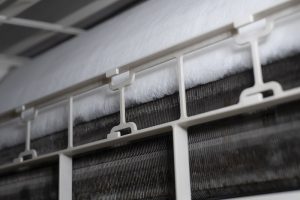Thinking about the possibility of frozen AC coils may not be particularly alarming. In fact, you may think that frozen coils mean that your air conditioner is extra cold. But unfortunately, the opposite is true. Instead of boosting cooling, your AC is likely producing warmer air thanks to the ice buildup blocking refrigerant lines.
You can keep reading to learn more about why frozen coils are bad news for your home’s air conditioner or heat pump. If you notice any of the signs we are highlighting or suspect your unit has frozen coils, give our team a call to schedule air conditioner repair in Conyers, GA. For more insights, check out why ice on your AC could signal trouble.
Identifying Frozen Coils
Signs of frozen coils include:
- Lukewarm air: The air blowing out of your air vents is lukewarm at best instead of specifically being cool or cold.
- High indoor temperature: If you measure the temperature inside your home, it’s going to be higher than you expect. In fact, the temperature reading on your thermostat may not even match the actual temperature of your home.
- Water leaks: Frozen coils mean ice buildup, and that ice has to melt sometime. You may begin to notice water leaking out or pooling around the indoor cabinet of your AC unit. If this happens or you are concerned about the other signs listed above, gently open the cabinet of your indoor AC unit and see if there is indeed ice on the coils.
Ice buildup can be hugely problematic for your air conditioner, and we encourage you to turn your AC off right away to allow the ice time to thaw. Take care and place a few towels around the bottom of the unit to absorb the melting ice and reduce water damage as much as possible. After that, give our team a call to schedule an AC service appointment so that we can get down to the root of the problem, fix it, and offer tips for preventing frozen coils again in the future. Additionally, you may want to learn about why a clogged condensate drain is a big problem.
Why Do Coils Freeze?
Evaporator coils usually freeze because of a lack of airflow into the system. It’s also possible that a refrigerant leak contributes by causing frost to build up and eventually develop into ice. The airflow problem usually goes back to having a clogged air filter.
If you suspect frozen coils, take a look at your air filter and see if it is full of dust. If so, you may have identified the reason your coils developed ice. Without enough airflow to absorb heat from, your coils freeze instead.
Tips to Prevent Frozen Coils
One step for preventing ice buildup is fairly simple. You just need to change out your air filter on time – every time. You can make a note of how long your air filter should last based on accompanying instructions and set a reminder to change it out in a month or two or three. This eliminates the guesswork of wondering exactly when you need to change it out.
You can also schedule preventative maintenance with our team annually. We can look over your system and identify problems, like weakening coils, and fix them before a refrigerant leak ever has a chance to happen. Learn more about how regular AC tune-ups can save you trouble.
Your Comfort Is OUR Business. Contact the team at Snellville Heating today to schedule an appointment for the highest quality HVAC services.




